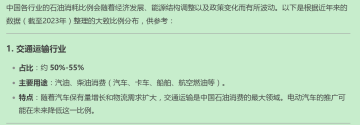China's consumption of oil was 756 million tons in 2024 and its production 213 million tons. It is nigh impossible to expect the 543 million ton discrepancy to be replaced by increased oil imports from Russia or from friendly countries that have overland pipelines to China.
Math doesn't check out. How much of China's oil was already from Russian/friendly countries? They don't need to increase by 543m tons; they need to increase by 543m- what they already send to China. And that's assuming that China's usage is stable. If the US/West wants to embargo us, no need to make things for them; their economies can suffer than. China's domestic demand can further be decreased by replacing ICE cars with electric and finally, China has supposedly 1 year's reserve in fuel for just in case. How long can Western economies survive with a ban on Chinese goods?
A "war economy" is not a medium- or long-term solution and if a hypothetical oil embargo/blockade is imposed on a long-term basis, this would be nothing short of disastrous for China's security.
It would be worse for them as the Western standard of living drops even further and China trades with the global south.
Additionally, I don't expect China to adopt a total war economy for a smaller conflict such as one involving Taiwan or the SCS region.
That's wrong. We are willing to go to full nuclear extinction war as a matter of principle on this.
The US and Europe have a tendency to switch to other sources when an embargo or sanction is imposed; their energy demands could be met by US oil exports while other consumer goods are being increasingly Vietnamese- or Indian-made. As China transitions to a services-based economy, the effect of sanctions and blockades become more pronounced on its economy.
The US and Europe have a tendency to screw themselves over with either reduced standard of living and/or buying the same Chinese things repackaged through transit countries, increasing the costs on US consumers.
The US does not technically need Pacific bases to mount attacks on China's mainland; its B-2 & B-21 bombers could fly directly from CONUS and its submarines are mostly capable of launching land-attack cruise missiles. To a lesser extent, carrier-based aircraft could also launch the JASSM-ER from standoff ranges while staying out of range of most Chinese area denial weaponry.
That's all out war. We can launch land to land hypersonics at NY to Los Angeles in that event. We have the nuke subs too. We will not let them touch our land without dealing higher damage to theirs.
Folks need to stop entertaining the idea that China would risk a nuclear exchange by attacking CONUS via space-based weaponry and ballistic missiles.
You need to stop pretending that China didn't declare that it will go to nuclear war over Taiwan.
You need to stop making all this shit up about the US attacking the Chinese mainland with B1 and B2 when in actuality, the US just replaced its own Taiwan's webpage with an affimation of the One China Policy and we have new politicians entering office saying that Taiwan isn't worth a single US soldier because it will eventually return to Beijing.
Yes, but the discussion is about the effect of international sanctions or a US-led naval blockade against China. The smaller countries may indeed be more import-dependent than China, but (1) they wouldn't be sanctioned or blockaded in the event of a Pacific conflict and (2) China would care far more about its own economy and security situation than what is being done to the smaller countries, especially if these effects impact its chance of success in the said conflict.
The effect of sanctions is that the Western economies tank themselves. The effect of naval blockades is that the USN gets chased and hunted down as China expands the size of oceanic space it goes through. If America needs to resort to piracy/terrorist fighting, it has already lost and is just hanging on as a final FU before it departs as the leading global power.
A key difference in the balance of power between the US and China is that the US would be able to degrade China's industrial capacity (including manufacturing and shipbuilding) because it is capable of attacking China's mainland, whereas China's ability to influence US industrial and production capabilities - which will undoubtedly increase in wartime - would be minimal or nil.
No, that is countered by a matter of will. If China's facilities are struck, it is no longer a limited war. We will not allow a technicality, that the US can use planes while we need to use intercontinental missiles, determine what can and cannot be hit. If they hit us, we hit them back harder. If we leave the world to Russia after annihilating each other, so be it. Once they see that, once they are struck with our hypersonics and they realize we're not going to be bound by a technicality, perhaps even without out it as we warn them that it will definitely happen, it is the US calculus that will say this war isn't worth it.
More like 50%-55%, according to deepseek . And among that,fuel for aviation and heavy equipment cannot be replaced by electricity in foreseeable future
View attachment 145057
Already addressed above in first paragraph.
Even if China blocks East/Yellow/South Sea,Japan can still trade with outside via Pacific Ocean,and Korea can go east into Sea of Japan then go into Pacific Ocean
What good are they? No one can replace Chinese manufacturing power.
Other user addressed. Also first paragraph addressed.
Don't need luck; need Chinese manufacturing power.

